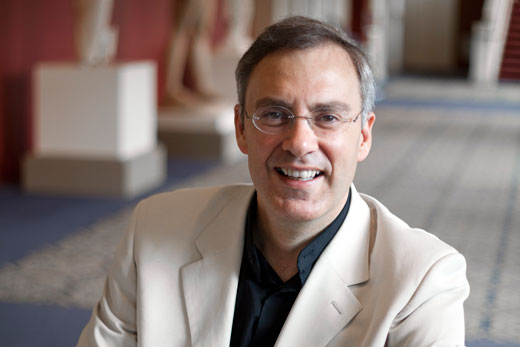Emory composer Richard Prior recently received Awards of Merit for composition and symphonic music for his "hymn for nations united" at this year's Global Music Awards.
Prior is Edward Goodwin Scruggs Conducting Chair and director of orchestral studies at Emory, where he conducts the university and youth symphonies. He speaks with Emory Report about composing, conducting and the upcoming Emory University Symphony Orchestra (EUSO) concerts April 19-20:
Your work "hymn for nations united" originally premiered in The Hague, Netherlands at the Association for Music in International Schools (AMIS). What was the idea and inspiration behind the piece?
AMIS is a major international consortium of students from all over the world who come together to form an honor orchestra, band and choir for an annual festival. That particular year, it was held in The Hague and I served as Composer-in-Residence. This work sets the W.H. Auden poem "Hymn for the United Nations," (yes, I adjusted the title for the composition), a celebration of universal nationhood and brotherhood.
The EUSO performed it here in 2005 and are presenting it again this April, opening the concerts before Beethoven's Symphony No. 9. As generously noted by Director of Choral Studies Eric Nelson, it is a great companion pairing to the Beethoven setting of the "Ode to Joy."
What other composing projects are on the horizon?
Several orchestras (including EUSO) have given performances this season of my "elegy for aurora" written in memory of those lost in the tragedy in Aurora, Co. I currently have two active commissions from the Atlanta Symphony Orchestra: one for a celebratory orchestral fanfare that will be premiered in June under the baton of Donald Runnicles, and the other for a large-scale symphonic poem that will receive several performances this fall, conducted by Maestro Robert Spano.
We had the pleasure of Robert's presence on campus for three years as the Emory Distinguished Artist-in-Residence during which time he heard my choral-orchestral work "Stabat Mater" and EUSO's premiere of my Symphony No. 3 (2011). The opportunity to have him hear my music was an incredibly valuable opportunity that has been truly transformative. I am also working on a string quartet for the Emory's quartet-in-residence, the Vega Quartet, to be premiered in March 2014 and several other smaller chamber and solo works for some international artists.
How do you handle the different roles of conductor and composer?
As you might imagine, many of the essential skills are the same; where the roles can differ is in their essential application to the disciplines. An awareness and sensitivity to instrumental color (or timbre), perception of musical architecture, idiomatic knowledge of the individual instruments, shaping of the dramatic flow—some of the truly innumerable facets and nuances of the craft are highly pertinent to both worlds.
Ultimately, the creative process of composing tends to be a highly solitary pursuit where one can become consumed—or at least highly distracted from all else—by the ideas and endless permutations of the smaller and larger details.
In the end, however, the all-critical outcome is in the sharing of your work with performers and of course, your audience. As my composition students are asked: Why do we create art, write music? Because we have something to express and that from the most basic human perspective requires the engagement of others in the resulting work.
Conducting requires similar careful solitary preparation, but by immersion in somebody else's musical ideas, often with the aspect of your own interpretation of the score. With conductors, however, that preparation is more consistently coupled with the extroverted energy of leading rehearsals in which the music is shaped and the dual narratives of original intent of the composer and overlay of the conductor's interpretation are realized simultaneously.
Are many conductors also composers?
There are certainly many good examples of composers who were also conductors; two obvious examples that spring to mind would be Mahler and Bernstein. There are also many examples of composers 'who conduct' and conductors 'who compose,' overall a subtle distinction! I do think that it is healthy that in an age of over-specialization that people are able to explore and function successfully in more than one capacity -- hence my fervent belief and investment in the liberal arts philosophy.
About 300 students in the Emory University Symphony Orchestra and University Chorus will be on stage April 19-20 for Beethoven's Symphony No. 9. What are the challenges in conducting and performing such a well-known work?
As I say to my students when we happen to prepare a work that is well known, this is really a two-edged sword: The good news is: everybody knows it! The bad news is: everybody knows it! So, to present a major work that is truly iconic in the repertoire and in our wider cultural consciousness is indeed both exciting and a challenge.
In Beethoven's "9th Symphony" however, it is probably the case that 'we' all know the final choral movement that sets Schiller's "Ode to Joy"; music that is now associated with some of the most transformative events in Western culture (for example, the fall of the Berlin Wall). We have an opportunity in these performances to place that extraordinary moment in its full and proper context, as the culmination of the symphonic journey that precedes it. There is no substitute for hearing and experiencing this music (or arguably, any) live, for either performers or audience; you always remember your personal intersection with Beethoven 9.
As the climax of the 10th anniversary celebrations of the Donna and Marvin Schwartz Center for Performing Arts, this is a fitting tribute to the extraordinary growth of the program both in terms of numbers and artistic ability. It speaks to the vision of what the next decade should—and must—bring for the Arts at Emory.

